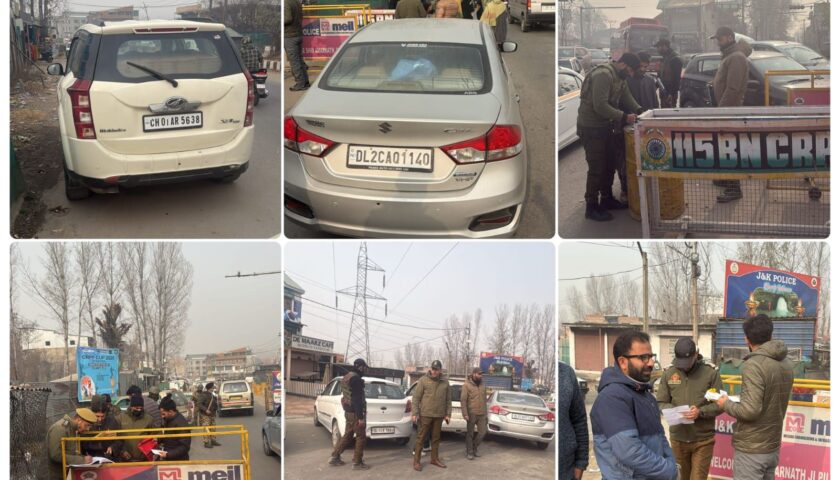Vegetable Prices Skyrocket in Srinagar: A Green Nightmare
By: Javid Amin
Srinagar, once a haven for affordable and fresh produce, is now grappling with a surreal situation: the price of vegetables has eclipsed that of meat. This unprecedented surge in prices has thrown the local populace into a state of disbelief and financial distress.
A staple in Kashmiri cuisine, collard greens, or Haakh as it’s locally known, now commands a staggering Rs 120 per kilogram, surpassing the price of chicken at Rs 115 per kilogram. This absurd anomaly highlights the extent of the vegetable price crisis gripping the region.
A market study conducted by Kashmir InFocus reveals a significant disparity between wholesale and retail prices, the root cause of this exorbitant cost burden on consumers. While collard greens are procured at Rs 50-60 per kilogram at the Parimpora Mandi, the retail price skyrockets to Rs 120 per kilogram within a mere 5-6 kilometers at Soura Vegetable Mandi.
This phenomenon is not isolated to collard greens. Tomatoes command Rs 130 per kilogram, peas at Rs 150 per kilogram, bitter gourd at Rs 120 per kilogram, local gourd at Rs 70 per piece, brinjals at Rs 80-100 per kilogram, and carrots at Rs 60 per kilogram. These prices reflect a shocking markup compared to the wholesale rates, leaving consumers bewildered and outraged.
The reasons behind this price escalation are multifaceted. Unfavorable weather conditions, transportation challenges, and the ripple effects of rising fuel costs have all contributed to the crisis. However, market manipulation by unscrupulous traders cannot be ruled out either.
The impact on the common man is devastating. With basic food items becoming increasingly unaffordable, families are forced to make difficult choices, often compromising on other essential needs. The situation is particularly dire for low-income households struggling to make ends meet.
The authorities have been urged to take swift action to address this crisis. Price control measures, strengthening supply chains, market surveillance, and consumer awareness campaigns are some of the steps that can be taken to provide relief to consumers.
Director of Food, Civil Supplies, and Consumer Affairs (FCS&CA), Kashmir, Riyaz Ahmad, has acknowledged the issue and assured action against violators. However, the onus also lies on consumers to remain vigilant and report price violations.
Chairman of the Fruit Mandi Association, Bashir Ahmad Bashir, attributed the price hike to unseasonal rains affecting crop production. While this may be a contributing factor, it does not justify the exorbitant price differences between wholesale and retail markets.
It is imperative that the government takes decisive action to protect the interests of consumers and prevent profiteering. The people of Kashmir deserve affordable and accessible food, and it is the government’s responsibility to ensure this basic right.
Consumer Burden and Government Inaction
The escalating vegetable prices have put an immense financial strain on consumers, forcing them to make difficult choices about their daily expenditure. With limited income, many are finding it challenging to afford both essential food items and other necessities.
Local residents like Muhammad Shafi express their frustration, highlighting the government’s apathy towards the plight of consumers. The dream of substituting meat with affordable vegetables has been shattered, leaving people with little choice but to bear the exorbitant costs.
A Bitter Harvest for Consumers
The steep rise in vegetable prices has cast a long shadow over households in Srinagar. What was once a staple part of the Kashmiri diet is now a luxury for many. Families are forced to make tough choices, often sacrificing other essential items to afford even a basic meal. The situation is particularly dire for low-income families who are struggling to make ends meet.
Factors Fueling the Price Hike
Several factors have contributed to the unprecedented surge in vegetable prices:
- Unfavorable Weather Conditions: Unseasonal rains and hailstorms have wreaked havoc on Kashmir’s agricultural sector, leading to reduced crop yields and supply shortages.
- Transportation Challenges: The mountainous terrain of Kashmir makes transportation of goods difficult and expensive. Inclement weather often disrupts supply chains, further exacerbating the price hike.
- Rising Fuel Costs: The increased cost of fuel has impacted transportation expenses, leading to higher prices for all commodities, including vegetables.
- Market Manipulation: Some unscrupulous traders may be taking advantage of the situation by artificially inflating prices.
A Cry for Relief
Residents of Srinagar are demanding urgent intervention from the authorities to address the escalating vegetable prices. They are calling for measures to stabilize prices, increase supply, and ensure fair market practices.
- Price Control Measures: Implementing price caps or subsidies on essential vegetables can provide temporary relief to consumers.
- Strengthening Supply Chain: Improving infrastructure and transportation networks can help ensure a steady supply of vegetables to the market.
- Market Surveillance: Strict monitoring of wholesale and retail prices can help prevent price gouging and unfair practices.
- Consumer Awareness: Educating consumers about their rights and encouraging them to report price violations can empower them to demand fair prices.
The rising cost of vegetables is a pressing issue that requires immediate attention from both the government and the community. Unless timely measures are taken, the situation is likely to worsen, causing further hardship for the residents of Srinagar.
A Call to Action
The escalating vegetable prices in Srinagar demand a collective response. It’s time for the government to step in and provide tangible solutions. Consumers must also play their part by being vigilant and demanding accountability. Together, we can address this crisis and ensure that the basic right to affordable food is upheld for all.




